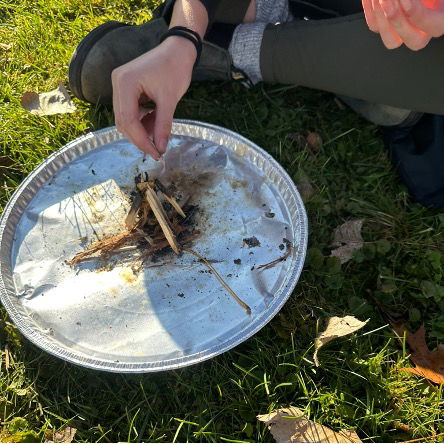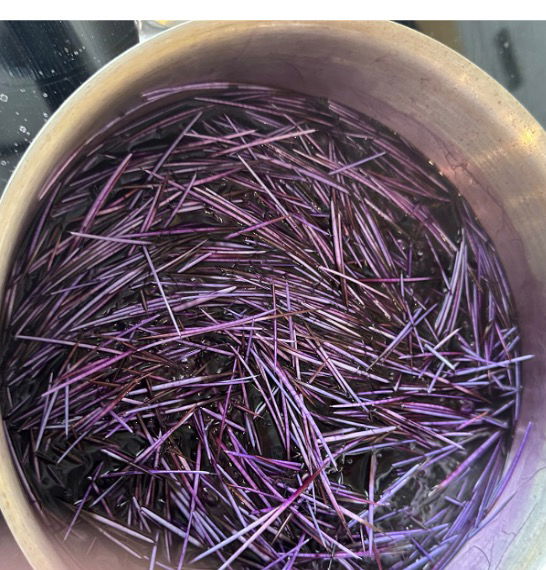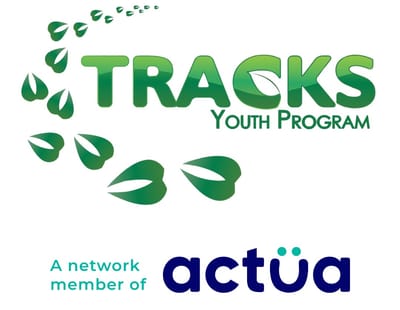Blog Post: TRACKS BSW Placement Experience
Blog Post by: Kimber Goodkey, BSW
My BSW placement with TRACKS was not a traditional placement, and that’s what made it meaningful. I was exposed to a wide variety of experiences from policy and best practice development, to front line work with kids, to developing a resource manual to extensive research on allyship, all within a single placement.
Volunteer Fair
My first event occurred on my first day of placement: the Trent Volunteer Fair. I was given a quick rundown about the agency, paired with someone from KWIC and from there was able to talk about TRACKS to interested folks. The most unique feature of TRACKS is the braiding of Indigenous and Western Knowledge and presenting it to students. This early exposure helps students in the local school systems to begin to have an alternative to their Western based education. At the volunteer fair, this piqued many people’s interest and is still something that sets TRACKS apart. (I’m on the left, smiling awkwardly, pretending like I’m not nervous…)

Fire Workshop
In the late fall I was able to accompany two TRACKS instructors (Shout out to Tanez and Jess!) to a local high school to help facilitate a Fire Workshop. We were working with a Grade 8 class, teaching them the elements needed to start a fire and braiding in traditional Indigenous teachings. It was interesting (and sometimes humorous) to watch some students start their efforts with incredible confidence only to realize it was more difficult than they first thought. Some students were impressive with the flint and steel, starting fires easily. Being able to watch first hand how TRACKS instructors braid knowledge was a powerful experience. (It was a bonus that my daughter was part of the class being taught.)

Elder’s Gathering
One of the key areas of my personal and professional life as a white settler, has been wrestling with what Indigenous allyship looks like for me. I am a big believer that action speaks louder than words. When the opportunity arose to volunteer at the Elder’s Gathering, I prioritized it, not only for me, but also for my kids. I instilled in them (and myself) that while we had signed up for specific roles, our job was to do whatever was needed. This proved to be true as I had volunteered for functional roles, but ended up getting pulled in other directions to meet the needs of the organizers.

The most impactful experience was getting to work with an Elder, preparing porcupine quills for her crafting workshop. I, and my kids, learned how to sort porcupine quills for the workshop. I also learned how to dye the quills so they were bright and colourful for the workshop. During one of the days, I was able to sit in on the workshop and learn the basics of quillwork (which is actually very similar to embroidery I learned growing up). Spending time with this Elder was a humbling experience. She spoke of the racism she still faces in her community. It was sobering to realize as much as I have been working hard on my allyship, much of the country has not. Working with this Elder had me thinking deeply about the need for me to make sure my allyship is always connected with meaningful action.
March Break Camp
Most recently I was able to help facilitate a March Break camp with the TRACKS team. I was able to make a tikanagan with the campers. I enjoyed being creative with the designs I used and seeing the designs the campers used. We also spent time on a hike exploring our senses on the Drumlin. While we were hiking between locations, I enjoyed the conversations that came up organically with the campers. Despite my being a mature student with my own kids in the camp, I was able to connect with the campers and enjoy meaningful conversations. Those conversations were the highlight of the experience for me.
Mental Health Work
One of the priorities of my placement was to assess TRACKS’ current policies and practices, looking for gaps or areas of improvement so the staff working for TRACKS could be as successful in their roles as possible. Mental health is a particular passion of mine and something I’ve been pursuing personally for almost a decade. I am also very passionate about seeing people learn how to care for their mental health at a young age. Given that the majority of TRACKS’ instructors are university students, I found this work to be important and exhilarating. (...yes I found research and policy work to be exhilirating, I’m just weird like that…) Based on my review and the needs identified by TRACKS leadership, I was able to develop policies and best practices to address those needs. This took an extended amount of time from the initial research, personal reflection (on my internalized white supremacy), drafting and then editing the policies and best practices. I realized during the course of my work that there may be opportunities to braid Indigenous approaches into the policies and best practices. This work challenged me as a settler trying to develop best practices that were culturally safe for Indigenous staff at TRACKS. I felt deeply my positionality and privilege as a white settler. This motivated me to explore resources from People of Colour and Indigenous people to hear their experiences with white supremacy. I paid close attention to their perspectives on how white people can challenge their own internalized superiority. While this was an uncomfortable line of thinking for me, I was (and am) committed to listening to marginalized voices and prioritizing their experiences over my own. My experience as part of a marginalized group had me ensuring that the policies and best practices I wrote would not cause further harm to other marginalized groups.
Experience as a Social Work Student
As a social work student, I have pursued Indigenous placements during my professional years at Trent. I am very passionate about putting my allyship into action in ways that benefit the Indigenous folks around me. This year the policy work and research that I did would directly impact those who work for TRACKS, about half of whom are Indigenous.
I initially struggled with the work I was doing as I was acutely aware that I, in my inexperience, could make it more difficult for Indigenous people working for TRACKS with the policies and best practices I was writing. I spent time researching white supremacy and listening to the voices of Indigenous people and people of colour. I invested time into recognizing my internalized white supremacy to ensure that I was approaching the policy development in an Anti-Oppressive way. This required many conversations with my supervisor as I wrestled with feeling like I was not the right person to be doing this work. It was probably one of the hardest things I have had to do during my time at Trent.
When I finally was able to develop the policies and best practices, I was both more confident and more humble in the work I was doing. Confusing? Let me try and break it down.
As part of my placement, I was able to listen to Indigenous voices speak about allyship, white supremacy and white saviourism. It is an important intersection. If, as a white person, you strive to be an ally without acknowledging your internalized white supremacy, it’s easy to fall into wanting to be the white saviour. This was my attitude when I first started at Trent: I wanted to fix all the problems and save all the people. This is where my humility comes in: my role in allyship is not to go ahead of Indigenous people and fix all of the things I think need fixing. That’s centring myself. Humility in allyship means working with Indigenous people in what they are already doing or what they are asking me to do. It means amplifying their voices, not speaking for them. It means making room for their voices in spaces where they have historically been excluded. It means accepting that I do not know best.
My confidence in allyship has come from walking out my allyship in my personal and professional life. Because of the hours spent listening to the voices of Indigenous people and people of colour (both personally and through online media), I now check myself for elements of white supremacy and saviourism in the work that I do. Why am I doing what I’m doing? When related topics are discussed in class, I am able to speak up with confidence. I speak to the issues that have been highlighted to me as problematic by Indigenous voices around me for my class to consider.
I’m grateful for the opportunity I had with TRACKS over the past 8 months of learning how allyship and professional practice can coexist. While it was not pleasant, having the time to wrestle with my internalized white supremacy and saviourism allowed my work to be as Anti-Oppressive as I could. As a social worker, moving from the end of my degree at Trent into the working world, it is my hope and deepest commitment to continue the work of allyship that I learned from my placement at TRACKS into my every day life.
Below: Sam (TRACKS ST member and Executive Director of KWIC), Kim, and Madi (Interim Director of TRACKS). A big chi miigwech to Kim for her work during her time as our BSW placement this year!!

